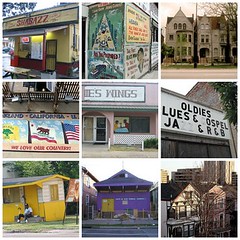House-cleaning
Speaking of Douglas Brinkley, I see his new book is the subject of a long piece in The Gambit, which speculates about how that book, apparently quite critical of Ray Nagin, might affect today's mayoral election. Living far from New Orleans as I do, I have no position on who the mayor should be, but I gather Brinkley believes it's time to clean house.
Anyway, while reading about all this, I was reminded of two articles. One is this piece about Brinkley from Slate, shortly after the death of John F. Kennedy, Jr. If you can put yourself in a 1999 frame of mind, it's pretty interesting to re-read it now.
Anyway, while reading about all this, I was reminded of two articles. One is this piece about Brinkley from Slate, shortly after the death of John F. Kennedy, Jr. If you can put yourself in a 1999 frame of mind, it's pretty interesting to re-read it now.
Brinkley is the kind of professor freshmen love, because he is a kind of überfreshman himself, wildly enthusiastic and infatuated with popular culture. He believes Jack Kerouac and Hunter S. Thompson are the giants of American literature. He quotes Ramones lyrics. He loves the word "troubadour." He refers to Lou Reed as "poet Lou Reed." ... Brinkley is a cheerleader for American history. Everything is a celebration. He likes to cite Kerouac's "I am not anti-anything" (except "racists" and certain big corporations). The civil rights movement was great. The Beats were cool. Dylan is amazing. He even wrote a kindly biography of Jimmy Carter. ... His America is conflict-free.I guess that's not the case anymore, since the new book is described as being of the "plenty of blame to go around" variety. (A point of view, by the way, that's not exactly surprising or new in discussions of Katrina and its aftermath.) On the other hand, there's this bit quoting Stephen Ambrose, who has since passed away:
"The word that is used around Doug is 'operator.' That is said scornfully or dismissively," says historian and Brinkley mentor Ambrose, who tapped Brinkley to succeed him as director of University of New Orleans' Eisenhower Center. "He is an operator, and I think that's wonderful. He's entrepreneurial and enthusiastic. It's very American."Hmmm. Draw your own conclusions about how that fits with the current book. For my part, there's one lingering question about Brinkley and Katrina that I wish someone would answer. Rolling Stone ran an article in the immediate aftermath of Katrina in which Brinkley had a cameo of sorts. The Rolling Stone reporter, describing preparations for a trip from Houston into New Orleans when the situation was still basically out of control and it wasn't going to be easy to get into the city, wrote this the following (I have put in bold the particular bit that interests me):
It's hard to find anyone who knows Brinkley and dislikes him. It's also hard to find anyone who knows Brinkley and doesn't worry about his obsession with fame. "His name-dropping is almost pathological," says one friend. In my conversation with Brinkley, he touched on a dozen famous politicians and artists he knows. His writing is full of sentences that begin something like, "As John Cage once asked me ..."
I'm in the lounge of the Four Seasons with Sean Penn and other assorted media creatures, debating the merits of rescuing animals instead of humans in a disaster area. To my left is the eminent historian Douglas Brinkley, a friendly academic whose careful diction reminds me of Bob Woodward's. Brinkley is my contact in Houston. He's friends with Penn, and when he evacuated his home in New Orleans earlier in the week, he left his cats and his maid behind in the flood zone. Now he and Penn are talking about commandeering private jets, helicopters and weapons for a grand mission into hell that begins tomorrow.Um, what? The article never makes clear why the maid was "left behind," or how she fared during and after the hurricane. Maybe his book says something about that. I wonder if she's okay. I wonder if she's still in New Orleans. I wonder who she's voting for.



<< Home